The political odd couple Axelrod was a senior adviser to former President Obama while Rove famously served under former President George W. Bush has put on their teaching hats to instruct a MasterClass on politics called "Campaign Strategy and Messaging," ITK has exclusively learned.
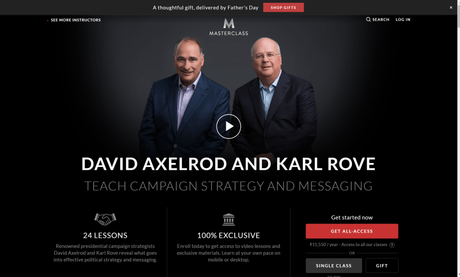
In this post, we have shared the David Axelrod & Karl Rove MasterClass Review 2019 with the main aim on campaign strategy and messaging. Read about Davi Axelrod & Karl Rove MasterClass Here!!
Who Is David Axelrod?
He was born on the 22nd of February 1955 and his place of birth is the Lower East Side of Manhattan in New York City but David Axelrod spent his formative years in Stuyvesant Town area. He is of American nationality as indicated by his place of birth and his ethnicity is white. His parents were liberal Jews engaged in professional jobs.

His dad's name was Joseph Axelrod - a psychologist and he was an immigrant from Eastern Europe to the US at age 11. David's mum has been identified as Myril Bennett - she worked as a journalist at a liberal-leaning 1940s newspaper known as PM, later in life, she proceeded to Young & Rubicam where she occupied the position of an advertising executive. However, his parent's marriage ended when he was eight and his father is known to have committed suicide in 1977.
Education & Career
David Axelrod achieved his early education from Public School 40 in Manhattan and continued at Stuyvesant High School, graduating in 1972. According to the political strategist, he was motivated by a sense of idealism during his formative years, the inspiring speech he witnessed at the age of five from the then president of the United States John F Kennedy in New York set his life on a political course and he is said to have contributed to Robert F. Kennedy's campaign by selling campaign buttons.
After Stuyvesant High School, he proceeded to study Political Science at the University of Chicago. During his undergraduate years, David Axelrod was already writing quality content on politics for the Hyde Park Herald and his internship was accomplished at the Chicago Tribune where he continued to work after graduation. By the time he was 27, he had already gained acclaim as the youngest political writer in the history of Chicago Tribune. However, he resigned from the paper in pursuit of a career as a campaign consultant after eight years of working as a political journalist. Needless to say that David Axelrod made a resounding success of his career in his chosen field.
About Karl Rove
Karl Rove, full name Karl Christian Rove, had born Dec. 25, 1950, Denver, Colo., U.S., American political advisor and principal architect of U.S. Pres. George W. Bush's two presidential election campaigns (2000, 2004).
Rove was political even as a young child. Though he attended the University of Utah and other colleges, he did not receive a degree, and in 1971 he went to Washington, D.C., to become executive director of the College Republicans. Two years later he with success ran for the post of chairman in a campaign managed by planner Lee Atwater, an early mentor.
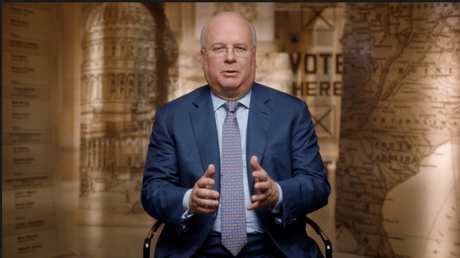
During the 1970s Rove was involved with various Republican organizations and candidates, including George H.W. Bush. Involved in Texas politics, Rove worked on the congressional campaign of George W. Bush in 1978 and, in the same year, on the gubernatorial campaign of Bill Clements, the first Republican to be elected to the state's highest office since Reconstruction (1865-77).
Rove shaped his own consulting business in 1981, with a list of clients that included Phil Gramm, elected to the U.S.
Career
Rove handled George W. Bush's flourishing politician campaign in 1994, and he was given a lot of credit for transforming Texas from a Democratic to a Republican stronghold, with the party holding all elected state offices by 1999.
Rove adroitly managed Bush's 2000 campaign for the presidency limiting press access to the candidate and specializing in a small range of rigorously chosen problems. The campaign evoked a vitriolic reaction from Rove's critics, who labeled him both ruthless and vindictive and accused him of underhanded tactics that included intrigue and the spreading of disinformation.
Rove, who was usually remarked as "Bush's Brain," became a senior authority within the executive and played an integral role in its political choices. In 2004 he was tasked with organizing the president's reelection campaign. At the time, Bush faced increasing criticism from those who were unhappy with the execution of the Iraq War.
Rove again exhibited his skill as a campaign manager in winning Republican votes through "micro-targeting," a process that involves delivering a specific, narrowly defined message to small subsets of voters and making a concerted effort to deliver those voters to polling sites. As the contest in 2000, the election of 2004 was exceedingly close, but Bush defeated his Democratic rival, John Kerry, with a small majority of both the popular and the electoral vote.
David Axelrod & Karl Rove MasterClass Review 2019: Why Should You Join It?
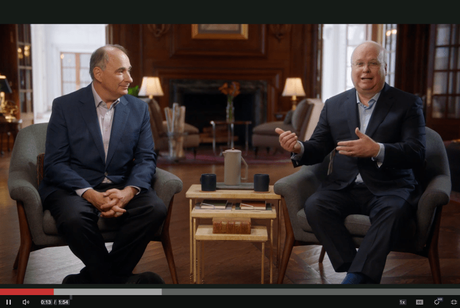
What you get in the David Axelrod & Karl Rove MasterClass?
You will get 24 video modules with 5+ hours of content plus a workbook that's structured tightly to cover every facet of campaign strategy and messaging, covering topics such as:
You know this is going to be a phenomenal MasterClass right from the start when it kicks off with an exhilarating opening in which we learn where David Axelrod & Karl Rove got their first footholds in politics and how their unlikely friendship began.
We tend to demonize those on the other side because we don't know them, but Karl thinks it's strange that people think it's strange that they're friends.
Here that David will be covering the message side of things, while Karl is more of a master planner.
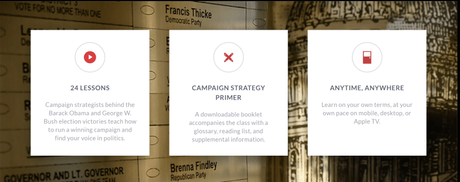
The aim with this MasterClass is all about getting us to understand what goes on inside a campaign because if we understand how hard it is to run for office knowing how winning candidates have to prepare and educate themselves with tremendous discipline, we'll end up having more confidence in the system itself.
What is MasterClass?
Entrepreneur Aaron Rasmussen and film editor and director David Rogier started MasterClass in 2015. Based in San Francisco, it's an online education platform for creative professionals.
Of course, you don't need to travel to San Francisco to take a MasterClass.
You can watch MasterClass courses using your computer or phone and consume the materials at your own pace.
As a student, you can learn the art of comedy from Steve Martin, writing thrillers from James Patterson, dramatic writing from David Mamet, screenwriting from Aaron Sorkin and lots more.
It is a great way of learning online from top creators you would not normally have access to.
Who is MasterClass For?
The MasterClass is for writers, photographers, artists, musicians, painters, and creative professionals. It's ideal for students who are happy to learn at their own pace using a computer.
Unlike Lynda or Treehouse, MasterClass is suitable for writers, musicians, artists, and creative professionals.
This is an interesting niche.
Many of the opposite online courses I've taken facilitate students learn business skills like promoting or additional sensible skills like writing or internet development basics.
The MasterClass isn't ideal for people who thrive in classroom environments and prefer a more hands-on approach from teachers.
Starting a Campaign
The first lesson is all about starting a campaign.
David Axelrod & Karl Rove are on opposing sides of the political spectrum, and yet they agree on so much with how to structure a campaign and their teaching style works seamlessly together - like a very well-oiled machine.
I think one of the reasons the two-man dynamic works so well is because you can really tell these two are good friends who have put a lot of thought into this class together.
We learn about the fundamental questions you need to start with when beginning a campaign and all about whom to target.
For example, in a campaign, if you have to pick one thing that is critical to success, it's whether or not the candidate has an idea about why they were running that made sense and seemed relevant to the voters. It's that message - in all the ways in which we can express a message - from candidate remarks to social media to ads - that's ultimately important to the voters.
Great messages are inferentially contrastive
Great messages project those qualities that your candidate has that their opponent doesn't have.
David gets into one of the biggest mistakes he made in a race - and why this is something you absolutely must avoid.
This was a fascinating strategy-building lesson on what to do about your weaknesses and how to be ready to go if they get attacked.
Thinking back over the last few presidential elections, it was amazing to put this stuff together and remember seeing some of this (or the lack of this) in different areas of different campaigns.
You'll really understand the Hilary-Trump face-off, for example, after this lesson in campaign strategy.
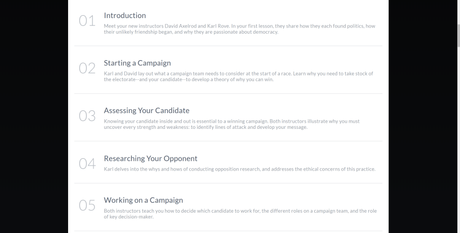
Political drama comes alive
Karl goes into a George W. Bush case study - the drunk driving one - in which they knew the information was out there and could hurt them but what they should have done is chosen a time sometime after he secured the nomination in which they the party would have willingly revealed the information themselves, got it out there, and got it behind them - instead of having it revealed for them.
We then get into the biases that women and people of color must contend with but also we learn about their strengths and how they are positively perceived.
This part of the course really gets you thinking about how to take an obstacle and turn it into strength.
Know Your Opponent
The researching your opponent part of this MasterClass was also fascinating, not just for the content itself but looking at what the other students are saying in the student comment section.
People are finding this class electric, informative, dramatic, educational, controversial and passions are running high - the greatest and the worst emotions.
One thing's for sure - there is not a dull moment in this MasterClass and no matter where you sit on the political fence, it's going to stir you up.
Not only do we go into the how and why of researching your opponent but I personally found the section on the ethical implications of researching your opponent fascinating.
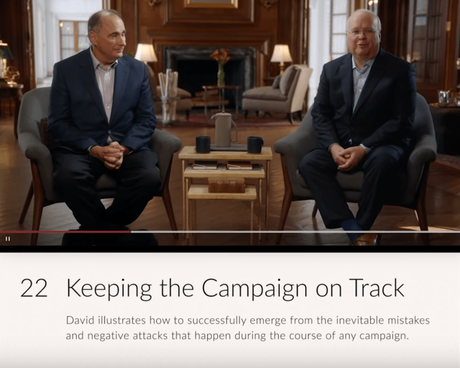
Then we get into the campaign plan itself. There are some great discussions about crafting a campaign around a message.
Also, nice bonus materials in the form of a downloadable Campaign Strategy Primer for a complete campaign timeline - not only is this stuff applicable for most fields but I think writers in the political thriller genre will find a ton of value in this course.
After you've got the details of the message, then it's all about practicality budgets, timings, volunteers, media, etc.
Here we analyze the subtle characteristics of the environment in which the election takes place - looking at the possible factors that shape the lens through which people view the election.
Analyzing historical data
Then we get into analyzing historical data in order to pick up patterns and estimate how the future is going to go. How to determine floor votes and ceiling votes through past losing and winning candidates?
Looking for the swing. You have areas that are really red and really blue but you also have locations where swing voters tend to be higher.
Karl goes into how he determines to get to 50% of the vote.
You learn all about finding who the people who need to be persuaded are and who the people who need to be motivated are.
How to get a 24-year-old to the voting booth in the first place?
We go deep into the value of micro-targeting, which was extremely interesting and kind of terrifying.
In 2004, they found if you owned a pickup truck in Ohio you were a Bush voter, but if you owned a Volvo you were a John Kerry voter.
In 2012, the Obama campaign found that if you listened to National Public Radio, you were an Obama voter.
The cool thing about micro-targeting is being able to understand what the key issues are that will motivate individual voters.
MasterClass Pricing Plans

There are two ways by which you can purchase a MasterClass, a single MasterClass and an All-Access Pass for any of the gurus on the platform.
The All- Access Pass comes in real handy when you wish to take more than one MasterClass, so this means that there is no limit on the number of MasterClasses on the All Access Pass.
30-day money back guarantee is also available for any of the MasterClass packages you purchase and you will get a complete refund of the amount in case you are not satisfied with their services.
You may also like:
Mobile application
Access your MasterClass exercises anyplace in quickly by downloading the MasterClass application for your iOS or Android gadget for free from the App Store and Play Store. Save exercises as top choices, modify the playback speed and watch them whenever you need to.
Conclusion: Is David Axelrod & Karl Rove MasterClass Worth? David Axelrod & Karl Rove MasterClass Review 2019: Pros & Cons
This MasterClass is about the elements of a successful political campaign while seldom broaching the ideology and morality inherent in politics. It's how to run a campaign, never why. Both of them offered good, general advice on how to win an election. Rove is obsessed with micro-targeting constituents through advertising and thinks direct mail is an eternally good way to reach potential voters. Axelrod, on the other hand, preaches the gospel of conducting focus groups as a way to understand what voters are concerned about.
Whether you're seriously considering a run for office - any office in any capacity - or you just want to understand what's happening on The West Wing, this MasterClass is an absolute must.


